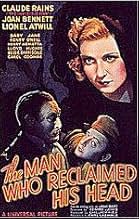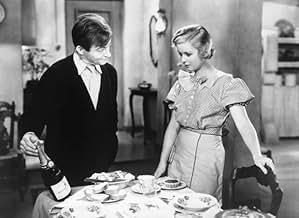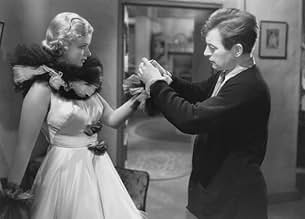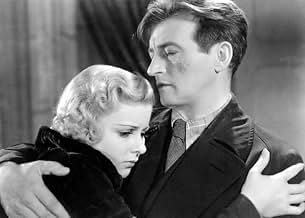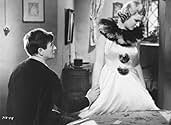A brilliant but impoverished writer, who is a pacifist, goes to work for a publisher and writes anti-war editorials. When he discovers that the publisher has betrayed him and is in league wi... Read allA brilliant but impoverished writer, who is a pacifist, goes to work for a publisher and writes anti-war editorials. When he discovers that the publisher has betrayed him and is in league with munitions manufacturers to make money off of war, he goes insane.A brilliant but impoverished writer, who is a pacifist, goes to work for a publisher and writes anti-war editorials. When he discovers that the publisher has betrayed him and is in league with munitions manufacturers to make money off of war, he goes insane.
Juanita Quigley
- Linette Verin
- (as Baby Jane)
William B. Davidson
- Charles
- (as William Davidson)
Judith Wood
- Margot
- (scenes deleted)
Norman Ainsley
- Steward
- (uncredited)
Bessie Barriscale
- Louise, the Maid
- (uncredited)
Ted Billings
- Newsboy
- (uncredited)
Phyllis Brooks
- Secretary
- (uncredited)
Rudolph Cameron
- Maitre D'Hotel
- (uncredited)
Russ Clark
- French Truck Driver
- (uncredited)
Carol Coombe
- Clerk
- (uncredited)
Harry Cording
- French Mechanic
- (uncredited)
Featured reviews
This is a great anti-war film with a commentary on the politics of power that is all too relevant today. Claude Rains plays Paul Verin, a pacifist writer with a great heart and mind but no ambition. Lionel Atwill plays Henry Dumont, the head of a newspaper chain who has no heart, a mediocre mind, and great ambition. The second type of man always needs the first type of man, and this sets up our story. Dumont just doesn't want to rule, he wants to make a fortune for himself and his friends through ruling, and he sees the greatest opportunity for monetary gain through war and the munitions business. First, however, Dumont needs to whip up the masses to be in his corner, and thus he turns his attentions to the writing skills of Paul Verin, who is duped by Dumont into believing they have the shared goal of furthering peace.
Joan Bennett plays Verin's wife, Adele, who is a very morally ambiguous character. Until the end, she can never make up her mind whether or not she loves the creature comforts of life more than Paul, and the fact that I couldn't decide whether I liked this person or not is a tribute to her acting.
The beginning starts with a bang, and the movie does have a bit of implied horror in it. The scene opens on a window breaking, a woman screaming, and a delirious Claude Rains staggering out of his house and into the snowy streets of WWI Paris carrying a mysterious satchel with one arm and his small daughter with the other. I'll let you watch and see how this all plays out. Highly recommended.
Joan Bennett plays Verin's wife, Adele, who is a very morally ambiguous character. Until the end, she can never make up her mind whether or not she loves the creature comforts of life more than Paul, and the fact that I couldn't decide whether I liked this person or not is a tribute to her acting.
The beginning starts with a bang, and the movie does have a bit of implied horror in it. The scene opens on a window breaking, a woman screaming, and a delirious Claude Rains staggering out of his house and into the snowy streets of WWI Paris carrying a mysterious satchel with one arm and his small daughter with the other. I'll let you watch and see how this all plays out. Highly recommended.
Claude Rains has already given such kind of characters of anti heroes, as the ones he showed in PHANTOM OF THE OPERA, or THE INVISIBLE MAN. Lon Chaney was also used to play such characters fighting against something which was about to destroy them, fights lost in advance. Universal Pictures seemed not being reluctant about those anti Hollywood schemes. Rains was the perfect portrait of the poor hero whom any audience could not ignore, nor feel empathy for. This was an early Edward Ludwig film, surprising and interesting as well for this director who will later become an adventure yarn specialist: WAKE OF THE RED WITCH, SMUGGLER'S ISLAND, JIVARO, FLAME OF THE ISLANDS, CARIBBEAN...But please don't miss this movie for Claude Rains' performance.
War is a matter many people take very seriously; whether they're hawks or doves. Unfortunately, some people profit from war, which means that they take making money very seriously; such that they would profit off of death and destruction.
Paul Verin (Claude Rains) was serious about peace. He was dead set against war as he saw it as a tool for certain people to gain money and power. He was a columnist who was well versed in putting his ideas eloquently onto paper. A man named Henry Dumont (Lionel Atwill) wanted to use Paul's abilities for his own newspaper. He claimed that Paul could work at the newspaper on his own terms. Paul refused because he knew it would only be a matter of time before he'd have to cave to the agenda of the newspaper (aka Henry Dumont) and thereby sellout.
Paul's wife, Adele (Joan Bennett), wanted him to take the position so that they could have some financial freedom. Having freedom of thought was fine, but how could that provide nice clothes and a warm bed? So, because of Paul's deep love for his wife, he accepted the position and moved his family to Paris.
The movie began in 1915 with France in the grips of a war. Paul was wearing a soldier's uniform and he was seeking the help of an attorney. He decided to tell the attorney the long version of his predicament, which is how we got his backstory.
"The Man Who Reclaimed His Head" was a deep movie. It was similar to "Men Must Fight" (1932) without the oversimplification of war. Paul was convincing as an intellectual who was satisfied with little more than his ideals and his wife. Such people always have to figure out how to navigate a world dominated by unscrupulous men of wealth. Ideals only take a man so far, and sometimes just a small bit of compromise could lead a person down a slippery slope of shedding their entire identity. Paul didn't want to be that man.
I like "The Man Who Reclaimed His Head." It was a relevant movie for any era. There will always be war and there will always be Paul Verins and Henry Dumonts.
Free on Odnoklassniki.
Paul Verin (Claude Rains) was serious about peace. He was dead set against war as he saw it as a tool for certain people to gain money and power. He was a columnist who was well versed in putting his ideas eloquently onto paper. A man named Henry Dumont (Lionel Atwill) wanted to use Paul's abilities for his own newspaper. He claimed that Paul could work at the newspaper on his own terms. Paul refused because he knew it would only be a matter of time before he'd have to cave to the agenda of the newspaper (aka Henry Dumont) and thereby sellout.
Paul's wife, Adele (Joan Bennett), wanted him to take the position so that they could have some financial freedom. Having freedom of thought was fine, but how could that provide nice clothes and a warm bed? So, because of Paul's deep love for his wife, he accepted the position and moved his family to Paris.
The movie began in 1915 with France in the grips of a war. Paul was wearing a soldier's uniform and he was seeking the help of an attorney. He decided to tell the attorney the long version of his predicament, which is how we got his backstory.
"The Man Who Reclaimed His Head" was a deep movie. It was similar to "Men Must Fight" (1932) without the oversimplification of war. Paul was convincing as an intellectual who was satisfied with little more than his ideals and his wife. Such people always have to figure out how to navigate a world dominated by unscrupulous men of wealth. Ideals only take a man so far, and sometimes just a small bit of compromise could lead a person down a slippery slope of shedding their entire identity. Paul didn't want to be that man.
I like "The Man Who Reclaimed His Head." It was a relevant movie for any era. There will always be war and there will always be Paul Verins and Henry Dumonts.
Free on Odnoklassniki.
I caught this on TV late one night. From the cheesy title, I expected a horrible *B* film. I've always been a fan of Claude...so I had to watch. Surprise, surprise, this movie is GREAT! It may have been a B film, but it has stayed with me for 30 years. Even though no one has ever heard of it, I recommend it often. As someone else remarked, it isn't a horror movie in the traditional sense. But the horrors of war is the subject. There was not a moment wasted in the direction. The opening shot pulls you right in. You can't believe your eyes. And then a flashback to an idyllic setting. But soon the war has turned our hero's life in pure Hell. The tale is about war profiteering. Strangely appropriate in 2006. Can you say Halliburton? The film brings you round to the opening scene again in a fantastic ending also. And the final words are exactly the opposite of what you expected in the opening scenes. Find & watch it!
This is an extraordinarily well filmed and written movie. And it'd have a hard time getting produced and distributed today. The Claude Raines character finds his Leftish anti-war writings used by war makers to promote World War I. His efforts to set things right are portrayed as ruthlessly blocked by elements the film portrays as both pushing the war in their own interests and essentially running the government: a ruling class consisting of the corporate elite in the form of munitions-manufacturing interests.
This is quite a political film, dark, tense and tragic. A neglected masterpiece.
This is quite a political film, dark, tense and tragic. A neglected masterpiece.
Did you know
- TriviaFinal film of Bessie Barriscale.
- ConnectionsFeatured in Son of Svengoolie: The Man Who Reclaimed His Head (1982)
Details
- Runtime1 hour 20 minutes
- Color
- Aspect ratio
- 1.37 : 1
Contribute to this page
Suggest an edit or add missing content


